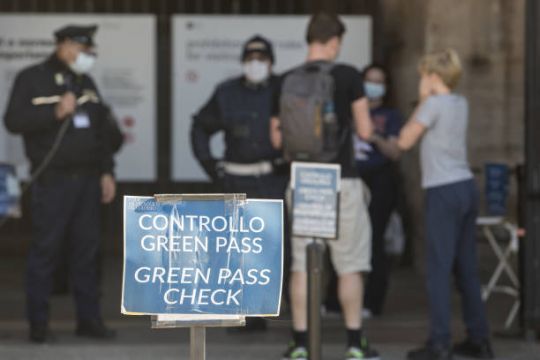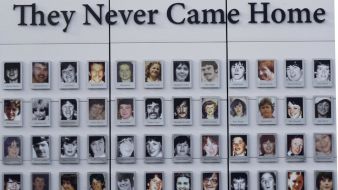As Ireland approaches October 22nd, doubt still remains about whether to ease all restrictions currently in place or just some.
With the Government set to decide next Tuesday, Ireland could be on the cusp of fully reopening for the first time since March 2020.
The picture for the rest of Europe, meanwhile, is mixed and some countries have fully reopened while others are still lagging behind. Here is a guide to Covid-19 restrictions across the continent.
UK
Back on July 19th, the UK lifted all restrictions meaning there is no longer a blanket requirement to wear face masks in public spaces or to socially distance.
A one-metre social distancing guidance remains in places such as hospitals and passport control. Face coverings are no longer required by law, but the UK government “expects and recommends” them in crowded/enclosed spaces
Some shops and transport operators still require masks, and they also signalled that people who were working from home should return to the workplace gradually.
All businesses and venues, including nightclubs and adult entertainment venues, are able to open. All capacity limits at sporting, entertainment, or business events have been lifted.
Hospitality venues such as pubs, restaurants and bars are no longer required to provide table service or follow other social distancing rules.
Italy
Covid-19 health passes became mandatory for all workers in Italy from Friday, with the measure being applied mostly peacefully across the country despite some scattered protests.
At the major port of Trieste, where some labour groups had threatened to block operations in protest against the rule, the situation appeared largely calm, with some workers demonstrating but others being allowed to carry on as usual.
“The Green Pass is a bad thing, it is discrimination under the law. Nothing more. It's not a health regulation, it's just a political move to create division among people...," said Fabio Bocin, a 59-year-old port worker in Trieste.
In Rome, police in riot gear stood by in front of a small rally with people shouting “No Green Pass.”
Denmark
The Nordic country lifted its last coronavirus restrictions in September after vaccinating a large part of the population.
Denmark began last month to give boosters to residents of elderly homes and others at risk of serious illness from the virus.
So far, 75 per cent of the population have been vaccinated, while 2.2 per cent of Danes have also received a booster.
Danish health authorities also said next week they will start inviting citizens to receive a third vaccination shot against Covid-19, according to Health Minister Magnus Heunicke.
France
Since Monday, October 4th, 2021, the health protocol applicable in schools, colleges and high schools has been level 1 or at green level in the departments where the incidence rate was below the threshold of 50 per 100,000 inhabitants over a period of five consecutive days
The French government's 'health pass' is compulsory in all departments to access certain places, establishments or events, indoors or outdoors, without any notion of gauge, such as cinemas, museums, cafés, restaurants, hospitals, retirement homes, medico-social establishments.
Since October 15th, 2021, PCR and antigen tests are no longer systematically covered by Health Insurance.
While many Covid-19-related restrictions have been lifted in metropolitan France, travellers are encouraged to familiarise themselves with those still in place.
Germany
Germany’s 3G rule has been in place since August 23rd, 2020. The Gs stand for the German words geimpft (vaccinated), genesen (recovered) and getestet (tested).
It means that only those who are vaccinated, recovered or have produced a negative result from either a rapid antigen test (within the previous 24 hours) or a PCR test (within the previous 48 hours) will be permitted entry to indoor dining establishments, to events and festivals held indoors, or to places providing accommodation.
The rule applies to all people aged six and above.
From October 11th, people who have not been vaccinated will have to pay for their coronavirus test.
Several federal states have introduced a 2G rule, in addition to the 3G rule, for events and restaurants.
It gives the hospitality sector, for example, the power to decide whether to allow indoor access to vaccinated and recovered (2G) persons only or also to those who can provide evidence of a negative coronavirus test (3G).
In order to contain the spread of coronavirus in Germany, far-reaching distance and hygiene regulations must still be observed. In public, a minimum distance of 1.5 metres to other people should be maintained if possible.
FFP2 or KN95 masks must be worn on public transport and in shops. Masks are also still compulsory in certain city centres or in busy public places.
Sweden
Sweden lifted all Covid-19-related restrictions in the country on Wednesday, September 8th, announcing that the pandemic has been brought under full control.
The country announced limited Covid-19-related restrictions that began on June 1st and ended on September 12th, The Public Health Directorate said in a statement
After Denmark and Norway, Sweden is the third Scandinavian country to totally abolish coronavirus-related restrictions.
According to the statement, rules such as wearing a mask at airports and on planes where international rules apply, as well as PCR testing, will continue to be enforced.
Meanwhile, the Swedish Foreign Ministry announced in a separate statement that all travel bans will be lifted on Oct. 1, 2021.
The Netherlands
The Netherlands has loosened some restrictions are some measures that are still is place.
They are advising people to keep to the basic rules to prevent the spread of coronavirus Work from home if you can, and go to the office if you must.
For weddings: there is no maximum group size and for funeral there are no restriction beyond distancing.
Almost all locations are open. The basic rules to prevent the spread of coronavirus still apply everywhere. Building managers must take hygiene measures. Some restrictions still apply:
-At certain locations people must show a coronavirus entry pass.
-Opening times are still restricted for all restaurants, bars, cafés and clubs. They must be closed between midnight and 6am, except for takeaway.
Everyone can participate in sports activities indoors and outdoors. Sports matches and competitions are permitted. Spectators are allowed under certain conditions.
Travel is permitted into the country, but different rules apply depending on when you have come from. An EU digital Covid cert and travel passenger form are both required.
Spain
Spain is one of the top European destinations with the highest percentage of the adult population that has already received the full dose of the vaccine. This means the territory is becoming increasingly safer.
They said they boast a highly professional health system capable of serving and responding to the healthcare needs of the population.
Tourism, leisure and hospitality establishments and businesses are prepared to offer a safe service; health control measures continue to be applied in the areas of cleaning and disinfection, along with limited occupancy levels, social distancing, promotion of hand hygiene and use of face masks on public transport or in enclosed spaces.
You can also enjoy outdoor activities such as going to the beach, doing routes and excursions or attending events without wearing a mask as long as the 1.5-metre social distancing rules are observed.
The EU Digital Covid Certificate has been introduced in Spain, thanks to which travellers visiting from EU countries can benefit from the special points of entry into Spain with a QR Fast Control code.
All passengers arriving to Spain by air or sea must fill in a health control form. In addition, those arriving from high risk countries must accredit their health status by showing that they are vaccinated, have recovered from the disease or have been tested proving that they are free of the infection.
Portugal
From October 1st, restaurants have no maximum limit of people per group as well of the end of requirement for digital certificate or negative test for access to restaurants.
The opening of bars and clubs and the end of limitation on the sale and consumption of alcohol.
It is mandatory to present EU Covid Digital Certificate in: major cultural and sporting events, bars and clubs, visits to health facilities and travel by air or sea.
The usual guidelines of social distancing, hand washing and respiratory etiquette apply.
Masks are required on public transport (including air transport and taxis0, concert halls and events, large commercial areas, residential structures for the elderly, health establishments and services.
Workers in bars, clubs, restaurants and commercial and service establishments are also required to wear a mask.
On beaches: on the accesses, walkways and sanitary facilities it is no longer mandatory to wear a mask, but the physical distance of 1.5m between each user is maintained.
Outside of Europe
Thousands of children returned to school in Sydney on Monday, putting an end to months of home learning, as Australia's largest city eased more Covid-19 curbs, thanks to rising rates of vaccinations.
Masks are no longer mandatory in offices and larger groups are to be allowed in homes and outdoors after the state of New South Wales, home to Sydney, hit a double-dose inoculation rate of 80 per cent at the weekend among those older than 16.
The latest in a series of planned easing of restrictions marks a shift by Australia's largest cities to living with the virus, a strategy officials have warned will bring a greater number of Covid-19 cases in coming weeks.
However, New Zealand's biggest city of Auckland will retain its lockdown for two more weeks as the country pushes to step up vaccinations, Prime Minster Jacinda Ardern said on Monday.
Once the poster child for stamping out COVID-19, New Zealand is now fighting a Delta variant outbreak that has spread across Auckland and neighbouring regions despite tough lockdown and border closures.
Ardern said there would be no changes to social curbs, the toughest in the OECD grouping of 34 leading economies, that have run for 62 days in Auckland. The lockdown in the city of 1.7 million began in mid-August.
Additional reporting Reuters







